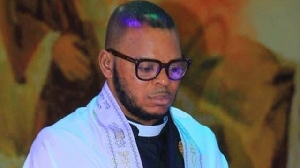Nobody in the land of the civilised is guilty until proven so. In 1884, a vigilante mob of more than 100 men from Washington Territory rode into Canada, abducted a 14-year-old Indian boy and hanged him from a tree.
The boy, a Stolo tribe member named Louie Sam, had been accused by the whites of killing a shopkeeper in Nooksack, in what is now Whatcom County. The killing nearly sparked a cross-border race war.
Now, more than a century later, the Washington authorities say there is convincing evidence the boy had nothing to do with killing the shopkeeper and was framed by the mob leaders.
Ironically, the worst form of mob justice was revisited when a hospital administrator here in Ghana was stoned to death, apparently on baseless suspicion that he was involved in ritual murder. Ironic because a typical example of mob justice is what happened at the courtyard of Pontius Pilate, with the crowd baying for the crucifixion of Jesus Christ of Nazareth over two thousand years ago.
It is natural that when we read about someone who we think has committed a heinous crime either going free or getting a ridiculously short sentence we feel vigilante justice is a rational, and justified, response.
But is our justice system so degenerated and our police service s o ineffective and hopelessly unreliable? Yesterday all the newspapers carried screaming headlines - ENNIN'S KILLERS GRABBED, 16 ARRESTED OVER PM'S LYNCHING. Indeed, the headline, 'Ennin’s Killers Grabbed’ is even a sin against our justice system which works on the fundamental principle of presumption of innocence.
It states that no person shall be considered guilty until finally convicted by a court. Not even the confessed suspect.
In Kenya, South Africa, Nigeria and Ghana mob hysteria and lynching over cases of suspected crime (from mobile phone snatching to body parts snatching) are on the ascendancy.
More worrying, for The Statesman, is the apparent lack of institutional concern on the part of the State over this murderous phenomenon. Thousands of Africans have lost their lives over suspicion of crimes that would ordinarily not have attracted anything near the death penalty.
The sociological apologists are quick to persuade us that a frustrated society will always resort to mob justice when the arm of the law is hopelessly short and ineffective.
But, there are others who will also say that mob justice is mostly meted out by hooligans who pretend to champion justice. The solution is in the policy response of the state.
The Statesman is repeating its earlier appeal to Government to come up with a specific solution to this inhuman act. Innocent people and suspects are being lynched and a government fails in its basic duty of protecting society when it continues to pretend that since this may be ‘popular’ it is not a serious concern for voters. But, leadership is often about more than what may be directly voter-friendly.
Our earlier calls for a special punitive legislative action against these criminals parading as vigilantes went unheeded, because then the victims were usually suspected street muggers and robbers.
But, we returned from our Easter vacation this week to the news that a mob had attacked and killed a man (a Presiding Member) who was carrying the remains of a relation in his car but was mistaken for a killer.
No form of such mob injustice should be acceptable to a society under a government that prides itself on respecting human rights.
Indeed, Government should be the first to act strongly against this because it is an indictment on the State’s ability to maintain law and order. Some even argue that mob injustice is symptomatic of failure of the political system to deliver on people’s needs.
People want security, justice and an opportunity to make a living. Unfortunately, when these needs are not met, they then resort to vigilante groups and instant injustice, is how that argument goes.
But should we simply ascribe this barbaric act to the incapability of the Police or the State to handle the crime wave?
We are calling on the President and his Cabinet to show some concern in this regard and draft a law that makes a special offence of mob (in)justice. We believe the symbolic message that such a law would send could do a lot to even create a greater sense of awareness in the minds of the ordinary people who take part in killing a compatriot on mere suspicion of crime. Let’s show some human rights credentials.
General News of Friday, 13 April 2007
Source: Statesman
















